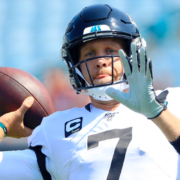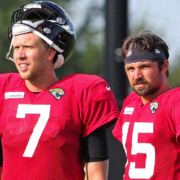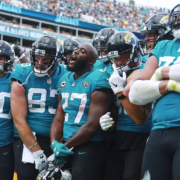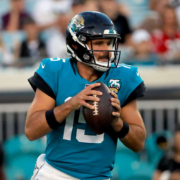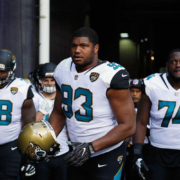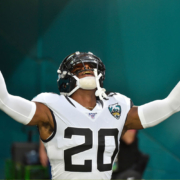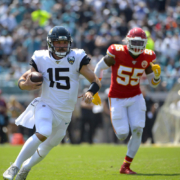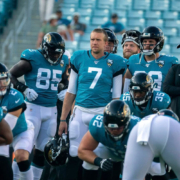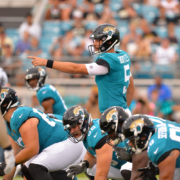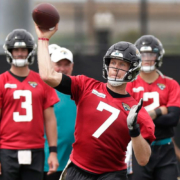Foles Leadership Unquestioned
For the Jaguars, Gardner Minshew is fun to watch as a leader. He is a jorts-wearing, mustache sporting, sunglasses-headband owning, cool guy who gives a swashbuckling tone to everything he does. He’s fun to be around. He jokes with his teammates and inspires them with his performance.
So what kind of leadership can they expect to get from Nick Foles?
When they’d show Foles on the sidelines recently while injured, the hoodie and glasses gave a “Who’s that guy?” impression to those who didn’t know he was the multi-million dollar quarterback of the Jaguars future. He didn’t jump off the screen as a team leader.
But don’t be fooled by what appears to be a detached demeanor. Foles has a quiet confidence and a clear head that allows him to take things as they are and perform at the highest level on the biggest stages. He’s very devoted to his Christian faith that follows the doctrine; he’s really not in control. But he uses the tools he’s been given, when he can, as good as anybody.
When he was injured in the Kansas City game at the beginning of the season, Foles immediately created clarity of mind, leaning on his faith.
“I was going into the locker room, I just realized this wasn’t exactly what I was thinking when I came to Jacksonville,” he said this week. “Obviously, you come here, and you want to create a culture and impact people, but at the end of the day, I was like, ‘God, this is the journey you want me to go on and I’m going to glorify you in every action, good or bad.’”
Leadership comes in many forms on a football field. Some players show it with toughness, others with a vocal exhortation of their teammates. There’s a common refrain among players who say they like to “lead by example” and still others who just have an aura that inspires their teammates.
Quarterbacks are, by nature and position, leaders. But how they get there oftentimes is very different from one another.
Tom Brady commands respect with his preparation and execution under duress. Patrick Mahomes leads with a joyful playfulness that brings his teammates along. Deshaun Watson does things that dazzle his teammates and makes them want to be a part of it. Same with Lamar Jackson. They all ooze confidence from the moment they step in the building.
For athletes and just anybody in a decision-making position, it doesn’t have to be religious faith that carries them in tough situations.
In his latest book “Stillness Is The Key,” author and researcher Ryan Holiday notes that Christians aren’t the only ones who call on a higher power to give them clarity in those situations. Every culture through the ages has recognized the need for a certain calmness of mind in times of adversity.
Roman philosopher Seneca and other Stoics called it apatheia. The Greeks refer to it as euthymia. Ancient Christians used the word aequanimitas. Buddhists, Muslims and Hebrews all had a particular word for the place you can go to in your own head to see a situation for what it is and can be, good or bad, without judging it as the best or worst thing that can happen.
That’s where Foles exhibits his leadership and his character. He’s solid as a rock when it comes to shouldering adversity.
Sports fans know his football odyssey with five stops in eight years including two different times in Philadelphia and a Super Bowl MVP Trophy. You might have read about the debilitating syndrome his wife Tori fights called POTS, postural orthostatic tachycardia syndrome, a malfunction of the autonomic nervous system. Or perhaps you read the couple’s announcement of Tori’s miscarriage last May.
So when Foles starts to talk, like he did this week for the first time since being injured, people listen.
Here’s how he explained how he approached the more than two months he’s been out of the starting lineup for the Jaguars. He believed that was his purpose for that time, rehabilitating his injury and helping Minshew in the quarterback room. But also getting to know his teammates on a whole other level.
“My purpose isn’t football, it’s impacting people, and my ministry happens to be the locker room,” he said. “And I’ve been able to get to know people, get to know these guys through an injury. Though I might not be playing, that is difficult from a fleshly perspective, but from a spiritual perspective, from my heart, I’ve been able to grow as a human being to where I feel like I’m at better situation here as a person then I was before because of the trial I just went under.”
If that sounds a bit like the beginning of a sermon, it was, and Foles said as much, adding he didn’t believe in the “Gospel of prosperity,” where only good things are supposed to happen.
Even though he hasn’t been in the lineup, Foles spoke to the team as they split up for the bye week, imparting a message to his teammates that had very little to do with football.
“You think your identity needs to be as a football player,” he told them. “You need to take a step back and realize you are more than a football player. Take this time to go into family time and take a breath. Step away from the game, clear your mind. Staying in the moment and just attacking the day at hand and simplifying things in your mind. The message was really simple.”
He’ll be able to make the throws, read the defenses and get the Jaguars offense into good play and out of bad ones. But what he’s focused on is every player getting the most out of their talent and then winning will take care of itself.
“At this point, culture is a really big thing,” he said of regaining the starting position from a popular teammate and not upsetting the balance in the locker room. “That is the biggest challenge of stepping back in there and playing football when it has been a while. I am a firm believer that in the fourth quarter, players make plays. If you trust the guy next to you, you are probably going to execute better than if you don’t. That is sort of what we are building here.”
The Greek philosopher Plato once said “Good actions give strength to ourselves and inspire good actions in others.”
If that’s truly the case, Jaguars fans should pick up the remote, clear their minds, take a deep, cleansing breath and flip on the game today to see where Nick Foles might take you.

